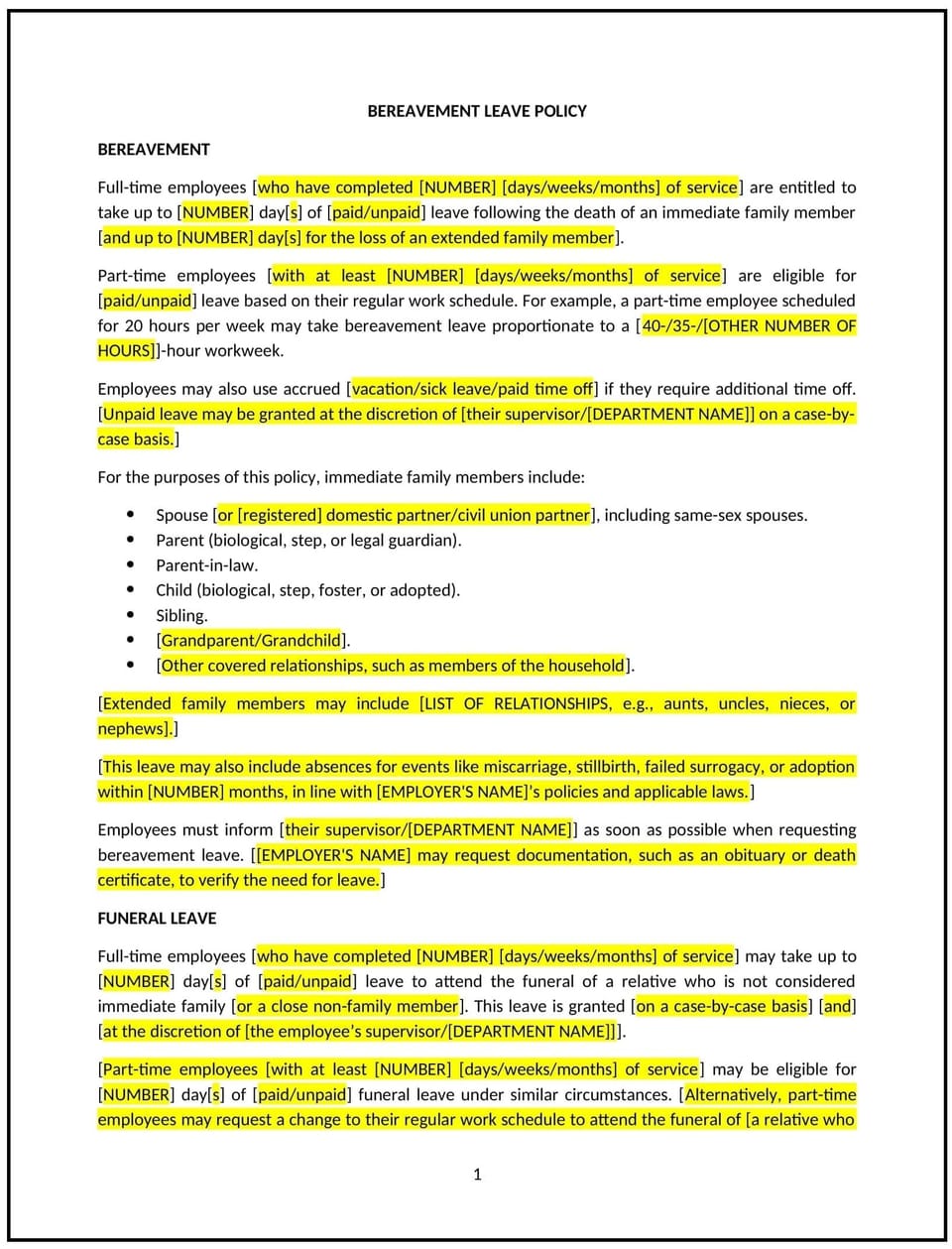Bereavement leave policy (Louisiana): Free template

Bereavement leave policy (Louisiana)
This bereavement leave policy is designed to help Louisiana businesses provide clear guidelines for employees needing time off to grieve the loss of a loved one. It outlines eligibility, leave duration, and procedures for requesting and approving bereavement leave while considering Louisiana-specific practices and requirements.
By implementing this policy, businesses can support employees during difficult times and promote a compassionate workplace culture.
How to use this bereavement leave policy (Louisiana)
- Define eligibility: Specify which employees are eligible for bereavement leave, such as full-time, part-time, or temporary staff.
- Outline leave duration: Clearly state the amount of leave available, including any variations based on the relationship to the deceased.
- Provide procedures for requesting leave: Detail how employees should notify their supervisors and provide any required documentation, such as an obituary or funeral notice.
- Address paid and unpaid leave: Indicate whether bereavement leave is paid or unpaid and clarify if employees can use other leave balances to supplement time off.
- Include additional considerations: Specify any accommodations for cultural or religious observances related to bereavement.
- Communicate management expectations: Outline how supervisors should handle bereavement leave requests with sensitivity and fairness.
Benefits of using a bereavement leave policy (Louisiana)
Implementing this policy provides several advantages for Louisiana businesses:
- Supports employee well-being: Helps employees navigate grief while balancing personal and professional responsibilities.
- Promotes fairness: Establishes consistent guidelines for all employees regarding bereavement leave.
- Encourages workplace compassion: Fosters a supportive environment during challenging times.
- Reduces misunderstandings: Provides clarity on procedures and leave options available to employees.
- Aligns with Louisiana-specific practices: Reflects regional considerations for managing bereavement leave effectively.
Tips for using this bereavement leave policy (Louisiana)
- Communicate policy details clearly: Ensure employees and managers understand the process for requesting and managing bereavement leave.
- Handle requests sensitively: Train supervisors to respond empathetically to bereavement leave requests.
- Document leave usage: Keep accurate records of bereavement leave to manage scheduling and compliance with company policies.
- Accommodate cultural needs: Be flexible in allowing time off for cultural or religious bereavement practices where possible.
- Review regularly: Update the policy to reflect changes in workplace needs or Louisiana-specific guidelines.
Q: Who is eligible for bereavement leave under this policy?
A: Eligibility is typically extended to full-time employees, but businesses may include part-time or temporary employees at their discretion.
Q: How much bereavement leave can employees take?
A: The amount of leave varies but is commonly three to five days for immediate family members, with additional time potentially granted for specific circumstances.
Q: Is bereavement leave paid or unpaid?
A: This depends on the business’s policy. Some businesses provide paid bereavement leave, while others may allow employees to use accrued leave for unpaid time off.
Q: What documentation is required for bereavement leave?
A: Employees may be asked to provide an obituary, funeral program, or similar documentation to support their leave request.
Q: Can employees request additional time off beyond bereavement leave?
A: Employees can typically use other leave options, such as vacation or personal days, if additional time off is needed.
Q: How should businesses handle bereavement leave for cultural or religious observances?
A: Businesses should consider accommodating cultural or religious practices by providing flexible leave options where possible.
Q: How often should this policy be reviewed?
A: The policy should be reviewed annually or when there are changes in workplace practices or Louisiana-specific guidelines.
This article contains general legal information and does not contain legal advice. Cobrief is not a law firm or a substitute for an attorney or law firm. The law is complex and changes often. For legal advice, please ask a lawyer.


